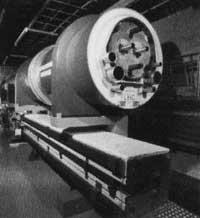US Physicists and CERN

American physicists are desperate that, after squandering 200 billion pesetas (or £10 billion), they have abandoned their large SSC particle accelerator project. They say it is the “most expensive hole in the world.” Their physicists have gathered to analyze the problem and analyze what they can do in Europe.
In Europe, the new director Llewellyn Smith, to study fractions physics at CERN laboratories in Geneva, presented a new project for the construction of the machine called LHC. It is about building an accelerator of 7 trillion trillion volts to obtain proton shocks in the place where the current OPE is located (that is, in a tunnel of 27 kilometers). 180 billion pesetas (9 billion pounds) will cost the part of superconductor electromagnets and cooling system, representing 75% of the project cost. This accelerator of impact analysis of protons allows to reach the core of the matter. If the project starts in 1995, the LHC machine will be operational in 2002.
American physicists also want to work there, but the CERN board has announced that scientists from non-member states will have to pay for the use of the accelerator.





